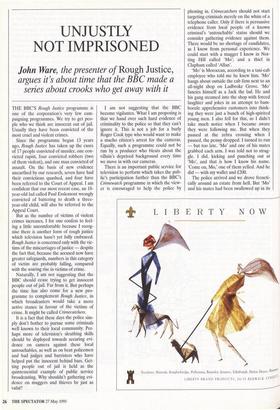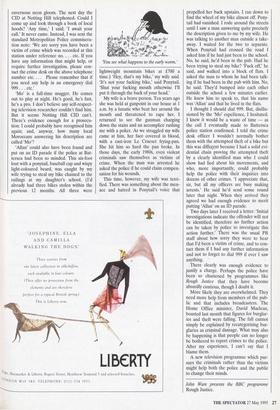UNJUSTLY NOT IMPRISONED
John Ware, the presenter of Rough Justice, argues it's about time that the BBC made a
series about crooks who get away with it
THE BBC'S Rough Justice programme is one of the corporation's very few cam- paigning programmes. We try to get peo- ple who we think are innocent out of jail. Usually they have been convicted of the most cruel and violent crimes.
Since the programme began 13 years ago, Rough Justice has taken up the cases of 17 people convicted of murder, one con- victed rapist, four convicted robbers (two of them violent), and one man convicted of assault. On the basis of new evidence unearthed by our research, seven have had their convictions quashed, and four have been referred to the Court of Appeal. I am confident that our most recent case, an 18- year-old lad called Paul Esslemont wrongly convicted of battering to death a three- year-old child, will also be referred to the Appeal Court.
But as the number of victims of violent crimes increases, I for one confess to feel- ing a little uncomfortable because I recog- nise there is another form of rough justice which television hasn't yet fully embraced. Rough Justice is concerned only with the vic- tims of the miscarriages of justice — despite the fact that, because the accused now have greater safeguards, numbers in this category of victim are probably falling, compared with the soaring rise in victims of crime.
Naturally, I am not suggesting that the BBC should cease trying to get innocent people out of jail. Far from it. But perhaps the time has also come for a new pro- gramme to complement Rough Justice, in which broadcasters would take a more active stance in favour of the victims of crime. It might be called Crimecatchers.
It is a fact that these days the police sim- ply don't bother to pursue some criminals well known to their local community. Per- haps more of television's sleuthing skills should be deployed towards securing evi- dence on camera against these local untouchables, as well as on bent policemen and bad judges and banisters who have helped put the innocent behind bars. Get- ting people out of jail is held as the quintessential example of public service broadcasting. Why shouldn't gathering evi- dence on muggers and thieves be just as valid? I am not suggesting that the BBC become vigilantes. What I am proposing is that we hand over such hard evidence of criminality to the police so that they can't ignore it. This is not a job for a burly Roger Cook type who would want to make a macho citizen's arrest for the cameras. Equally, such a programme could not be run by a producer who bleats about the villain's deprived background every time we move in with our cameras.
There is an important public service for television to perform which takes the pub- lic's participation further than the BBC's Crimewatch programme in which the view- er is encouraged to help the police by phoning in. Crimecatchers should not start targeting criminals merely on the whim of a telephone caller. Only if there is persuasive evidence from local people of a known criminal's 'untouchable' status should we consider gathering evidence against them. There would be no shortage of candidates, as I know from personal experience. We could start with a mugger I know in Not- ting Hill called `Mo'; and a thief in Clapham called 'Allan'.
'Mo' is Moroccan, according to a taxi-cab employee who told me he knew him. `Mo' hangs about outside the cab firm next to an all-night shop on Ladbroke Grove. 'Mo' fancies himself as a Jack the lad. He and his gang steamed into the shop with forced laughter and jokes in an attempt to bam- boozle apprehensive customers into think- ing they were just a bunch of high-spirited young men. I also fell for this, so I didn't take much notice when I became aware they were following me. But when they paused at the zebra crossing when I paused, the penny dropped. I turned to run — but too late. `Mo' and one of his mates grabbed each arm. I was told not to strug- gle. I did, kicking and punching out at `Mo', and that is how I know his name. `Come on, Mo,' one of them yelled. And he did — with my wallet and f200.
The police arrived and we drove freneti- cally around an estate from hell. But `Mo' and his mates had been swallowed up in its cavernous neon gloom. The next day the CID at Notting Hill telephoned. Could I come up and look through a book of local hoods? 'Any time,' I said; 'I await your call.' It never came. Instead, I was sent the standard Metropolitan Police commisera- tion note: 'We are sorry you have been a victim of crime which was recorded at this station under reference no. . . . etc. If you have any information that might help, or require further investigation, please con- tact the crime desk on the above telephone number etc. . . . Please remember that if you need any help in an emergency dial 999 . . . etc.'
`Mo' is a full-time mugger. He comes out to play at night. He's good, he's fast, he's a pro. I don't believe any self-respect- ing television researcher couldn't find him. But it seems Notting Hill CID can't. There's evidence enough for a prosecu- tion: I could probably have recognised him again; and, anyway, how many local Moroccans answering his description are called `Mo'?
`Allan' could also have been found and put on an ID parade if the police at Bat- tersea had been so minded. This six-foot lout with a ponytail, baseball cap and wispy light-coloured beard, was caught by my wife trying to steal my bike chained to the railings at my daughter's school. (I'd already had three bikes stolen within the previous 12 months. All three were You see what happens to the early worm.'
lightweight mountain bikes at £700 a time.) 'Hey, that's my bike,' my wife said. `It's not your fucking bike,' said Ponytail. `Shut your fucking mouth otherwise I'll put it through the back of your head.'
My wife is a brave person. Ten years ago she was held at gunpoint in our house at 1 a.m. by a lunatic who beat her around the mouth and threatened to rape her. I returned to see the gunman charging down the stairs and an accomplice rushing me with a poker. As we struggled my wife came at him, her face covered in blood, with a cast-iron Le Crueset frying-pan. She hit him so hard the pan broke. In those days, the early 1980s, even violent criminals saw themselves as victims of crime. When the man was arrested he asked the police if he could claim compen- sation for his wounds.
This time, however, my wife was terri- fied. There was something about the men- ace and hatred in Ponytail's voice that propelled her back upstairs. I ran down to find the wheel of my bike almost off. Pony- tail had vanished. I rode around the streets until I saw a man answering quite precisely the description given to me by my wife. He was talking to another man outside a take- away. I waited for the two to separate. When Ponytail had crossed the road I asked him if he had just been to the school. No, he said, he'd been in the pub. Had he been trying to steal my bike? 'Fuck off,' he said, and walked into a block of flats. I asked the man to whom he had been talk- ing if he had been in the pub with him. No, he said. They'd bumped into each other outside the school a few minutes earlier. He knew him to speak to, that his name was 'Allan' and that he lived in the flats.
I thought I should dial 999. But, disillu- sioned by the `Mo' experience, I hesitated. I knew it would be a waste of time — as the call I eventually made to Battersea police station confirmed. I told the crime desk officer I wouldn't normally bother them with the attempted theft of a bike but this was diffeAent because I had a solid evi- dential chain proving the attempted theft by a clearly identified man who I could show had lied about his movements, and who, more importantly, could probably help the police with their inquiries into dozens of other crimes. 'I appreciate that, sir, but all my officers are busy making arrests.' He said he'd send some round later that night. When they arrived they agreed we had enough evidence to merit putting 'Allan' on an ID parade.
Two days later I received a letter: 'Initial investigations indicate the offender will not be identified, therefore no further action can be taken by police to investigate this action further.' There was the usual PR stuff about how sorry they were to hear that I'd been a victim of crime, and to con- tact them if I had any further information and not to forget to dial 999 if ever I saw anything. • There clearly was enough evidence to justify a charge. Perhaps the police have been so chastened by programmes like Rough Justice that they have become absurdly cautious, though I doubt it.
More likely they are overwhelmed. They need more help from members of the pub- lic and that includes broadcasters. The Home Office minister, David Maclean, boasted last month that figures for burglar- ies and theft were falling. The fall cannot simply be explained by recategorising bur- glaries as criminal damage. What may also be happening is that people can no longer be bothered to report crimes to the police. After my experience, I can't say that I blame them.
A new television programme which pur- sues the criminals rather than the victims might help both the police and the public to change their minds.
John Ware presents the BBC programme Rough Justice.



































































 Previous page
Previous page